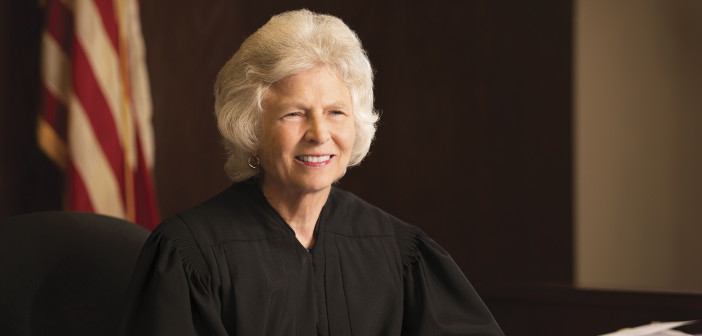The Honorable Judith A. Fullerton has been a judge in the Seventh Judicial Circuit Court of Genesee County since January 1, 1983. She was initially elected to serve as a Flint District Judge in 1980. At the time, she was the only woman on the bench in the County, and paved the way for other female judges to follow. During her tenure as a Circuit Judge, she has seen many changes, including the transition from stenographic to video court reporting; establishment of the Family Court in 1999; sentencing guidelines for criminal cases; increased courtroom security, and the use of support dogs for children who are victims of sexual assault or abuse.
Fullerton grew up on a farm in Oklahoma. She attended Vassar College in New York and earned a Bachelor of Arts degree, then went on to George Washington University, where she received her Juris Doctor in 1970. She began her career in the District of Columbia as a staff attorney with the U.S. Securities and Exchange Commission. After moving to Flint in 1972, she took the Michigan Bar Exam. “I wanted to get on with my career,” she remembers. She was Genesee County Assistant Prosecuting Attorney from May 1972 to July 1978, then served as Flint’s Chief Assistant City Attorney.
What motivated you to become a judge?
My grandfather and brother were both judges in Oklahoma – there were seven lawyers in the family. So, when the first opening occurred at the then 68th District Court, I just went for it. Since then, nine women have become judges in Genesee County, in addition to Celeste Bell, who was recently appointed to replaced Judge Archie Hayman.
Tell us about a typical day at the courthouse.
It depends: on Mondays, I hear civil and criminal motions in the morning and do sentencing in the afternoon. Other days can be Trial Days. Most of my time, however, is devoted to pre-trial matters. My docket is always different – most of my cases are scheduled for jury trial, both criminal and civil. Fortunately, most resolve, inasmuch as a trial can last from a few days to as long as three to four weeks.
What are some of your more memorable cases?
One of the most significant was Berlin & Farro in the ‘80s, involving a toxic waste site near Swartz Creek. Afterwards, a local resident put a sign on his barn that said, ‘Thank God for J. Fullerton.’ The Sheree Miller murder case was also memorable – there was a book written about it, Fatal Errors. The serial stabbing case was tried in my court by Genesee County Prosecutor, David Leyton, himself. In 2016, I had a case with four defendants and four juries, which lasted four weeks. No one else has ever done that in Genesee County.
As the only female judge when you were elected in 1980, what challenges did you face?
Scrutiny. I faced lots of scrutiny. The attorneys watched everything I said and did, and would ask, ‘can she do the job and make the right call on a tough case?’ I had to show them I could do the job by working hard.
What advice do you have for women who follow in your footsteps?
Do your job, pay attention and do your very best.
What women do you admire and why?
In particular, I respect two women: Sandra Day O’Connor and Ruth Bader Ginsberg. After graduating from Stanford Law School, O’Connor could not get a job as an attorney and had to start out as a secretary. Look how far she went! She became the first woman Supreme Court Justice! Ginsberg is still a sitting Supreme Court Justice, despite a battle with cancer. She is a great role model for all woman judges and lawyers. She speaks her mind and takes care of herself. Although she is in her eighties, she has a personal trainer and does pushups every day!
What is your best quality or trait?
I’m a hard worker. I keep at it, although the docket is relentless.
What do you like most (and least) about being a judge?
The job has great variety. There are so many different types of cases and lawyers have very different ways of presenting their positions. The best thing is that it’s never boring. The worst part is figuring out how to get through the piles of work.
What do you do for fun?
I love animals. I have an interest in animal rights, and I support rescuing animals and animal causes. I have two dogs: a Chinese Crested and a Chihuahua. I used to run every day, but now I just walk the dogs – it’s good for them and for me. I also enjoy traveling with my husband Ward Chapman, and our daughter, Sarah.”
What are your plans for the future?
I will leave the bench at the end of the year; not because I want to, but due to age limitations imposed by Michigan law. A person is not allowed to be elected to a Michigan judgeship after reaching the age of 70. I haven’t made any plans yet, but I’m sure there will be something for me!
The walls of the Honorable Judith A. Fullerton’s chambers are filled with pet calendars – a testament to her support of animal causes. And, her desk is piled high – a testament to her work ethic. Throughout her years at the courthouse, she has had a great staff, many of whom have worked with her for long periods of time. “They are great at helping me get the job done,” she says. It’s also been quite fulfilling for her to see some of the younger lawyers who have tried cases in her courtroom become judges, such as Judge Vikki Bayeh Hayley, Judge Jennifer Manley and Judge Mark Latchana. “It has been very rewarding to see these attorneys move up the ladder,” she shares. “I expect great things from all of them.” Fullerton is also excited to see Celeste Bell begin her judgeship. “She has a lot of enthusiasm and it is great to have her join the Circuit Court as the first female African-American judge.”
“I faced lots of scrutiny. I had to show
them I could do the job by working hard.”
Judith A. Fullerton
Photos Provided by Mark Blaine














